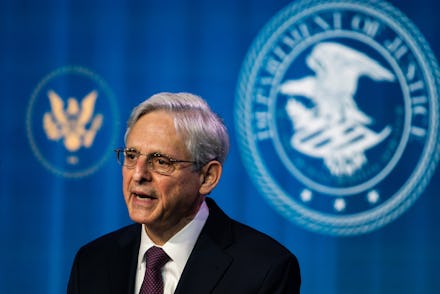Merrick Garland is the new attorney general. Here's what his new gig entails

If you look at the United States as a band, you can think of the president as the frontman. They're the face of the country and the most well known person in the administration. With President Biden's inauguration, people were not only eager to replace the U.S.'s frontman but to have entirely new people backing him up (a.k.a., the Cabinet). This week, Biden's Cabinet grew once again, as the Senate confirmed Merrick Garland to be the new attorney general. So now that Garland has the job, what does the attorney general actually do?
Like most roles in the Cabinet, the president appoints the new attorney general and can do so at will. That's because unlike roles like the Federal Reserve chair, where appointees serve for four years, the attorney general doesn't have a set term. Being appointed doesn't automatically mean that someone takes up that role, though. After the president nominates someone, the Senate holds a confirmation hearing.
Biden nominated Garland, a federal judge, to head up his Department of Justice. Garland was actually nominated to the Supreme Court in 2016 by former President Barack Obama, to replace the late Justice Antonin Scalia. His nomination ended up being blocked by then-Senate Majority Leader Mitch McConnell. But McConnell supported Garland this time around, likely clearing the way for other Republicans to do so too.
In the end, Garland was confirmed with a 70-30 split. Let's break down some of the roles that Garland will take on in his new gig.
The head of the world's largest law enforcement agency
The attorney general is in charge of the Department of Justice, which, according to the White House, is the world's largest law enforcement office with a budget of about $25 billion.
Per its own website, the DOJ's mission is to "enforce the law and defend the interests of the United States." Organizations within the DOJ include the Drug Enforcement Administration, the Federal Bureau of Investigation, the U.S. Marshals, and the Federal Bureau of Prisons.
If those organizations didn't provide a hint, you can look at the attorney general as the chief law enforcement officer of the federal government. They oversee each state's own attorney general and take on the role of advising the president and heads of other executive departments on legal matters. But the attorney general does a lot more than just advise the president.
The representative for the U.S. in federal court cases
Pretty much anybody can be sued — including the United States itself.
When that happens, the U.S. needs to have representation, too, and that role falls to the attorney general's office. The attorney general themselves may sometimes appear before the Supreme Court to represent the U.S. But along with domestic courts, they represent or supervise the representation of the U.S. government in foreign courts, too.
The only Cabinet member who doesn't have the "secretary" title
All right, this is less of a role and more of a fun fact. But if you look at Cabinet positions, you'll notice all of them begin with secretary. There's the secretary of defense, secretary of education, and so on. The only exception to that rule is the attorney general.
The attorney general isn't called something like the secretary of justice for two reasons. First, the position was created by the Judiciary Act of 1789 — almost a century before the establishment of the Department of Justice in 1870. You can't be the secretary of a department that doesn't exist.
In addition, the attorney general's role looked way different at its start. It wasn't meant to be a secretary position; instead, the DOJ's website explains that the AG job began as a part-time position to represent the United States in court. As the workload grew, it soon became clear that one person couldn't do it all alone, and a whole office might be needed. This came to a head following the Civil War, where the amount of litigation involving the U.S. required a bunch of private attorneys. So, Congress created the Department of Justice, with the attorney general at its head.